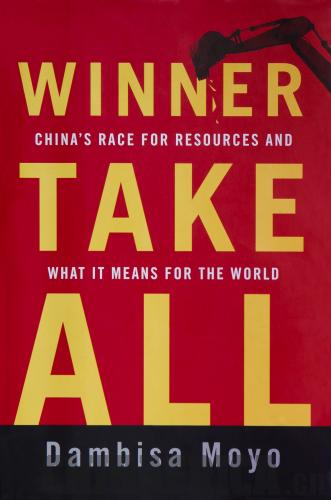| 
Zambian-born Dambisa Moyo has made a reputation for herself as a leading economic commentator in recent years.
June 2012 marked the release of her third book, Winner Take All: China's Race for Resources and What It Means for the World.
Winner Take All was highly anticipated, and debuted at No.13 on The New York Times Bestsellers' List. It sees Moyo detail how current economic trends are leading to a future in which China's voracious demand for resources means an acute scarcity of almost everything.
Moyo's central premise is that China has already cottoned on to this impending scarcity, and is not-so-surreptitiously planning for it by buying up resources the world over and securing the infrastructure to transport them home. The aim: to sustain the increasingly "Western" consumption habits of the country's rapidly expanding urban middle class.
Moyo says Western nations are wholly unprepared for this future. Their election-mandated shortsightedness and inability to act in markets as sovereign wholes – as China's state-owned enterprises effectively do – mean they are being outbid, outmaneuvered and thoroughly outplayed by forward-thinking China.
Moyo presents China's growing economy as the main catalyst for the resource scarcity of the future. But she maintains that its government – through the activities and acquisitions of state-owned enterprises abroad – is behaving as a rational player, ensuring the country doesn't end up lacking the building blocks of prosperity: arable land, commodities and energy. Prosperity means social stability, and that's something the Chinese Government would very much like to maintain.
As is the case in Moyo's previous books, Winner Take All contains more statistics than the Amazon forest has trees. While not all are up to date – she references a Pew Survey from 2007 on how Africans view the increasing Chinese presence on their continent – the book cannot be accused of being poorly researched.
But at some points it seems Moyo has almost too much to say. The scope of the book is perhaps overly broad – in almost every subsection of every chapter, Moyo analyzes the state of an entire world market for a resource, whether it be land, water, oil or copper, before arriving at the implications of China's rise for the future of that market. This approach would be difficult to pull off in 500 pages, let alone in the 250 she's constrained to here.
This shortage of space becomes more acute toward the end of the book. In chapter nine, for example, she launches into an explanation of the reasons why 1 billion people go hungry around the world every day (there are three, apparently), before abruptly cutting away to discuss the pros and cons of shale oil. It's a dizzying, unconnected jump.
That being said, the book is still worth the read, if only for the chapters on China's role in Africa's economic development.
Winner Take All isn't the first time Moyo has written about China's role in Africa. Her first book, Dead Aid: Why Aid Is Not Working and How There Is Another Way for Africa, published in 2010, was an intellectual hit job on Western models of foreign aid to Africa. In arguing that such aid is not only ineffective, but even brings harm to the continent, Moyo rankled many a good samaritan and set off a hurricane of policy debate that lifted her book – essentially a technical economic treatise – to the top of The New York Times Bestsellers List.
In Dead Aid, Moyo holds up China's business-oriented approach to the African continent as superior to Western aid initiatives, which, she writes, are paternalistic and crippled by political preconditions. This won her a strong following in China and, in an unusual accolade for a book published in the West, saw her name mentioned by a top Chinese politician.
"I have read a book titled Dead Aid written by Dambisa Moyo. The author… draws the conclusion that China's assistance to Africa is sincere, credible, practical and efficient and is welcomed by the African people," said Chinese Premier Wen Jiabao at the 2009 Focum on China-Africa Cooperation summit in Cairo, Egypt.
In Winner Take All, Moyo seems most at home defending China's development approach to the African continent. China's efforts stand in stark to Western initiatives, she reiterates.
Winner Take All certainly won't be the last we hear of Dambisa Moyo. |